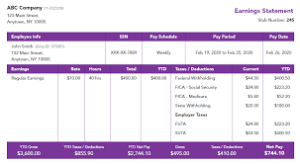Paycheck stubs are an essential tool for property managers when evaluating potential tenants. These documents provide crucial information about an applicant’s income and employment history, helping property managers make informed decisions.
However, in an age where deception is becoming more sophisticated, it is important to be vigilant and knowledgeable when it comes to spotting fake paycheck stubs. In this article, we will explore the importance of verifying paycheck stubs, understand the components of a genuine paycheck stub, identify common signs of fake paycheck stubs, learn how to spot inconsistencies, discover tools and resources for verification, discuss best practices for property managers, explore the legal implications of accepting fake paycheck stubs, and provide tips for preventing deception in the rental application process. By the end of this article, you will have the knowledge and tools to ensure transparency and trust in your property management endeavors.
The Importance of Verifying Paycheck Stubs for Potential Tenants
As a property manager, your primary goal is to find reliable and trustworthy tenants for your rental properties. Verifying paycheck stubs is a critical step in the tenant screening process to ensure that applicants can afford the rent and have a stable source of income. By examining paycheck stubs, you can assess an applicant’s ability to meet their financial obligations and make timely rent payments. This verification process helps minimize the risk of renting to individuals who may default on their rent or pose a financial burden on your investment properties.
Understanding the Components of a Genuine Paycheck Stub
To effectively identify fake paycheck stubs, it is crucial to understand the components of a genuine paycheck stub. A genuine paycheck stub typically includes the employee’s name, the name and address of the employer, the pay period, the employee’s gross earnings, deductions, and the net pay. Additionally, it may include property information such as the employee’s Social Security number, tax withholdings, and any additional income sources. Familiarize yourself with the layout and structure of legitimate paycheck stubs to easily spot discrepancies and inconsistencies that may indicate a fake document.
Common Signs of Fake Paycheck Stubs
Fake paycheck stubs are becoming increasingly sophisticated, but there are still common signs that can help you identify them. One of the telltale signs is poor quality printing, such as blurred or smudged ink, irregular fonts, or misaligned text. Legitimate paycheck stubs are usually printed with high-quality equipment, so any signs of low-quality printing should raise suspicion. Another red flag is the absence of certain key information, such as the employer’s contact details or the employee’s Social Security number. Fake paycheck stubs may also lack the necessary deductions, such as taxes or health insurance premiums. Keep an eye out for these signs when reviewing paycheck stubs to protect yourself from potential deception.
How to Spot Inconsistencies in Paycheck Stubs
Inconsistencies within paycheck stubs can be strong indicators of fraudulent activity. Pay attention to the numbers and ensure they add up correctly. Look for inconsistencies between the stated gross earnings and the net pay. If the deductions seem unusually low or nonexistent, it could be a sign of tampering. Additionally, compare the paycheck stub to other documents provided by the applicant, such as bank statements or tax returns. Any discrepancies between these documents should be further investigated. By meticulously reviewing paycheck stubs and cross-referencing them with other financial records, you can uncover inconsistencies that may expose fake documents.
Tools and Resources for Verifying Paycheck Stubs
Fortunately, there are numerous tools and resources available to property managers for verifying paycheck stubs. Online services, such as paycheck stub verification platforms, can help authenticate the legitimacy of paycheck stubs by cross-referencing information with external databases. These services often use advanced algorithms and data analysis to detect inconsistencies and flag potential fake paycheck stubs. Additionally, you can contact the employer directly to verify the employment and income information provided by the applicant. By utilizing these tools and resources, you can enhance your ability to detect fake paycheck stubs and make more informed decisions during the tenant screening process.
Best Practices for Property Managers in Validating Paycheck Stubs
Validating paycheck stubs requires adherence to best practices to ensure accuracy and reliability. Start by requesting paycheck stubs from all applicants and establish a consistent policy of verification for all potential tenants. Develop a checklist outlining the key components to review and verify on paycheck stubs, such as the employee’s name, employer information, and deductions. Create a standardized process that includes thorough documentation of your verification efforts. By implementing these best practices, you can establish a systematic approach to validating paycheck stubs and maintain consistency in your screening process.
Legal Implications of Accepting Fake Paycheck Stubs
Accepting fake paycheck stubs can have severe legal implications for property managers. It is essential to understand the laws and regulations governing tenant screening and the verification of financial documents. Depending on your jurisdiction, accepting fraudulent paycheck stubs may constitute negligence, fraud, or breach of duty. These legal implications can result in financial penalties, damage to your reputation, and potential lawsuits. By diligently verifying paycheck stubs and following legal guidelines, you can protect yourself from legal repercussions and maintain the integrity of your property management business.
Tips for Preventing Deception in the Rental Application Process
Preventing deception in the rental application process starts with establishing a robust screening process. Request comprehensive documentation from potential tenants, including paycheck stubs, bank statements, and employment verification forms. Verify the information provided by cross-referencing it with reliable sources, such as employers and financial institutions. Conduct thorough background checks to uncover any red flags or inconsistencies in an applicant’s history. Additionally, consider working with professional verification services that specialize in vetting tenant applications. These services have access to comprehensive databases and advanced algorithms that can help identify fraudulent documents and flag potential risks.
Working with Professional Verification Services for Paycheck Stubs
Professional verification services can be valuable allies in the fight against deception in the rental application process. These services specialize in verifying paycheck stubs and other financial documents, using advanced technology and data analysis to detect inconsistencies and identify potential fraud. By partnering with a reputable verification service, property managers can save time and resources while ensuring the accuracy and reliability of the tenant screening process. Consider researching and selecting a verification service that aligns with your specific needs and requirements. By leveraging their expertise, you can enhance the effectiveness of your tenant screening process and minimize the risk of accepting fake paycheck stubs.
Contact Us
In the world of property management, transparency and trust are invaluable assets. Thankfully, the team at Rent Portland Homes can save you the time, money and hassle of managing your rental properties yourself.
To learn more about the services we can offer you, contact us today by clicking here.




